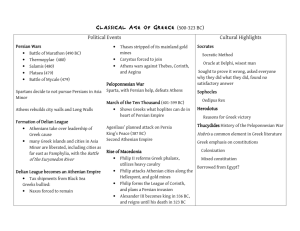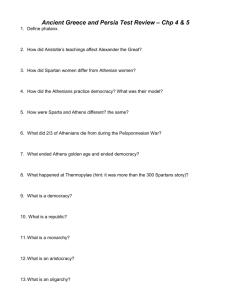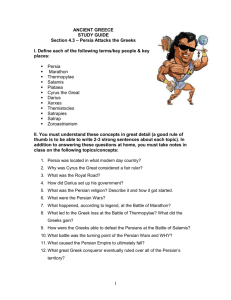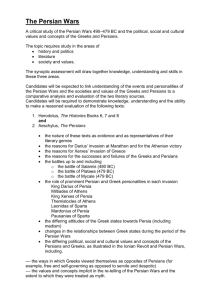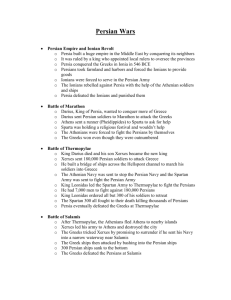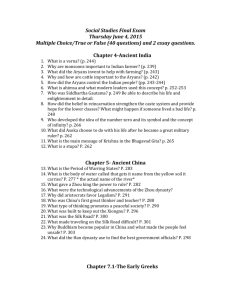File
advertisement
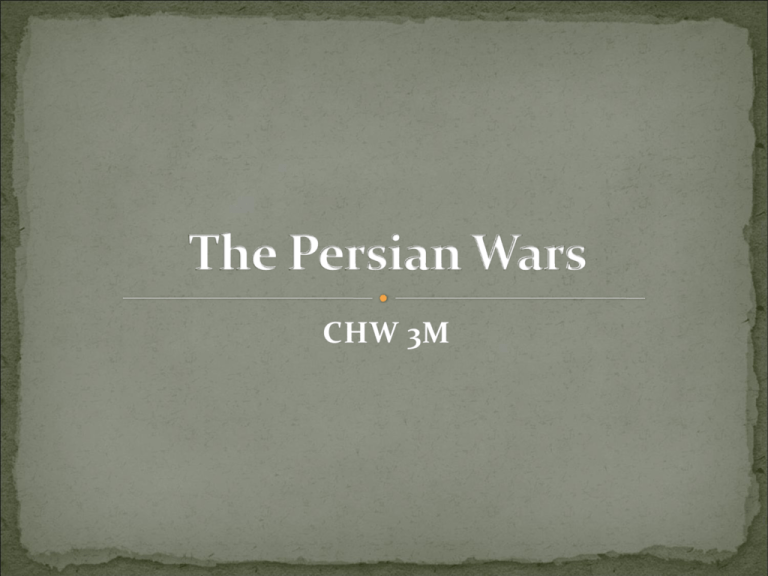
CHW 3M The Archaic Period of Greek history closed with the Persian Wars Persia the mightiest state the world had ever seen, capable of assembling army of over a million men The large city-states of Athens and Sparta might be able to assemble 10 000 hoplites, but other states could provide only a few hundred each Our main source for the Persian Wars is Herodotus, the “Father of History” By 6th century BCE, Persians threatened Greek homeland Compared to Persia, Greek city-states were tiny, scattered units, weakened by fighting one another, illprepared to defend themselves A coalition of all Greek city-states would only equal a fraction of Persian power 559 BCE, Cyrus the Great King of Persia 546 BCE, Cyrus the Great made Persians masters of the Greeks living in Asia Minor Ionians revolted in 499 BCE Ionians backed by Athens Persians crushed the rebellion five years later Persians did not forget the affront to their power Made Persian resolve for conquering Greece mainland stronger 490 BCE, Darius king of Persia Sent a fleet of 20 000 soldiers to punish Athens for helping Ionian revolt Persian fleet advanced across Aegean sea as far as the Plains of Marathon, about 40 km northeast of Athens Athenians asked for help from Spartans, but for religious reasons, they could not come until after full moon Athenian army of 9000 went to Marathon to meet Persians Since the Persians placed their best troops in centre of their formation, Athenians countered by strengthening the wings of their force Persians broke through weakened Athenian centre, but Greeks defeated them on the wings Athenian troops closed in on Persian soldiers in centre Greeks charged Persians as they fled to their ships Persian threat had been beaten back, but empire far from destroyed Persian fled to ships looking to attack undefended Athens. The Athenians ran 25 miles back to Athens in order to beat the Persian (12-14h to sail). When the Persians saw the Athenian army waiting for them inside the city walls they gave up and sailed back home to Persia territory. 1. The victory gave the Greeks incredible confidence in themselves, their government and their culture 2. Strengthened other Greek CityStates resolve (Sparta) to resist Persian rule Phidippides Famous Athenian runner Phidippides • Ran from Athen to Sparta to seek help, ran distance of 250 km in 2 days, then ran back to Marathon • According to legend, runner collapsed and died after gasping out message • His amazing feat made marathon running a popular sporting event censored Ten Years Grace Themistocles was the most prominent politician in Athens after the first Persian invasion. He continued to advocate a strong Athenian navy, and in 483 BC he persuaded the Athenians to build a fleet of 200 triremes; these would prove crucial in the forthcoming conflict with Persia. Battle of Thermopylae (2nd Persian Invasion 480 BC) King Xerxes decided that he would invade Greece by land • 180 000men, 1200 warships • made Pontoon Bridge to cross Hellespont (narrow strait between Greek mainland and Asia Minor) • first encounter with Greeks at Thermopylae, narrow mountain pass Athens and Sparta decided on strategy to defend a narrow pass in central Greece called Thermopylae (the Hot Gates) through which the Persians had to pass Small force of 4000 soldiers led by King Leonidas and his bodyguard of 300 Spartans was sent to hold pass until the full Greek army arrived Local Greek betrayed them by showing Persians a mountain path around Thermopylae Seeing that his forces were being trapped, Leonidas ordered most of army to leave He and his Spartan force held the pass as long as possible, fighting valiently, but all were killed Not one Greek soldier survived the battle Small Group of Greek including Athenians and Spartans set up barricades At Thermopylae. Several days The Massive Persian army could not get through barricade. After a few days, a Greek traitor led the Persians through a mountain pass where a few They secretly came around this back way and surrounded the Greeks. A group of three hundred Spartan soldiers, along with some others, agreed to stay at Thermopylae and fight the Persians even though they were surrounded. They would fight as long as they could sacrificing themselves to give the others time to get away. Defeat at Thermopylae made Athens vulnerable City had to be evacuated and most people escaped to Salamis, a large island off the coast of Athens Persian army poured into Athens and took revenge on city for its defeat at Marathon Battle of Salamis Knowing they could now not defend their city the Athenians, under their general Themistocles, deliberately left Athens undefended and lured the Persian fleet into a narrow strip of water between the island of Salamis and the Greek main land. The Persian would burn Athens but the Athenian warships caught the Persian ships by surprise. Trapped in the narrow water the Persian ships were destroyed. Xerxes and army would then retreat to Hellespont Boeotian plain near town of Platea United army of Greek city-states, led by Spartans, met Persians in all-out battle Greeks were victorious It was a turning point in the history of Greece, ushering in the Classical (or “Golden”) Age After Platea, Greek navy attacked the Persians again in Asia Minor and freed the Ionian Greeks The Invasion Ends(479 BC) Greeks amass army of 40,000 and defeated 60,000 Persian at Mycale, off the coast of Asia minor. The remaining Persian fleet was completely destroyed.
